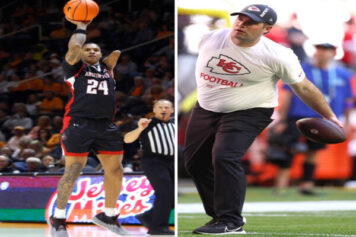Spring training is underway. The MLB headlines are still dominated by performance-enhancing drugs. Players are being linked to them, their careers smeared. There’s all this talk about MLB.
Yet, fans keep coming to baseball games.
More importantly, fans still care about the game and hold it to a higher standard than any sport in this country.
It tells you just one thing: baseball is still America’s pastime.
Stop with the NFL’s TV rating, which—by the way— hit a four-year low this past season. Worse, the NFL has had declining attendance the previous five years coming into 2012.
For me, the true measure of any sport, show, performance or event has always been ticket sales. The DVD sales are a nice bonus for a movie, but the success of a motion picture is based on how many people actually pay to come to the theater.
In baseball, fans just can’t get enough. In 2012, MLB recorded its fifth-best attendance mark in history with 74.8 million fans attending games. It was the sport’s best mark since 2008.
Even more impressive, baseball’s attendance increased for the second straight season, remarkable during these tough financial times. Normally, when money is short, the first thing cut from the budget is going out to see entertainment. Instead, most will simply stay home and watch TV.
It truly is a testament to the mass appeal of the sport and the desire to go out to the ballgame.
And people aren’t coming out in just the big markets, but all over the country. There were nine teams that drew over three million fans, last season, including Detroit—a city filled with economic hardships.
The bad Colorado Rockies had the 13th-best attendance in the game.
Baseball, once painted as a dinosaur, has never been healthier. For all the talk about the Steroid Era, baseball has enjoyed its best attendance years mostly after all the homeruns left the yard . Better than the years of the Mark McGwire-Sammy Sosa home run battle that had the nation watching in 1998.
When all the homer magic wore off and it was revealed to fans that some of their favorite stars had used PEDs, fans didn’t respond as if it was fake, like wrestling, or like they had been hoodwinked.
Instead, they came out in even bigger numbers. People always considered the Golden Age of baseball to be in the ’50s. Not true. It’s right now.
And if it’s all about TV ratings and not attendance, why does the NFL still have that silly TV blackout rule? It’s simple. Without it, the NFL would be embarrassed to have mostly half-empty stadiums being broadcast on TV. They are afraid they couldn’t sell out eight home games a year in 75 percent of NFL America.
The NFL can stick its chest out about its TV ratings, but, really, how hard is it to get fans in the cold-weather months to stay in on a Sunday afternoon?
If the NFL—which changed its blackout policy to stipulate that 85 percent of the tickets have to be sold 72 hours before the game—was all about ratings, it would drop the blackout all together. Fans could stay at home and the TV ratings would go even higher. But that's not going to happen because they understand how important attendance is to a sport.
In the final year of Monday Night Football on broadcast TV, it was rumored that then-NFL commissioner Paul Tagliabue tried to give the Monday Night Raw people money to move the wrestling event. Apparently, it was hurting MNF’s ratings on ABC.
The NFL has one big thing going for it: it’s the perfect gambling sport. That’s what fuels people to watch. Play fantasy football and click on stories on the Internet. Fans are invested because they can make loot off of the game.
Even on the PEDs tip, fans don’t care about it in the NFL. Ravens’ linebacker Ray Lewis was linked in an SI story right before Super Bowl and no one even blinked.
Had that been a baseball player right before the World Series, it would have been a hot mess.
When I think of the face of steroids, it isn’t Barry Bonds or Mark McGwire – it’s Lyle Alzado. He admitted he started taking stuff in 1969 and said, on his deathbed, that 90 percent of athletes he knew took steroids. Somehow, people only care if it happens in baseball.
You can have your TV football broadcast all you want, but there’s nothing better than going to the ballpark, sitting in the bleachers on a crystal-clear, warm June evening with a hot dog and a beer.
Baseball’s robust attendance numbers tell you that America agrees.



